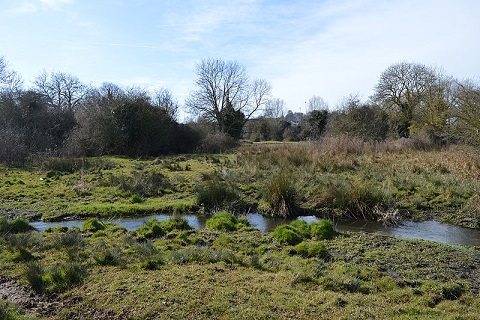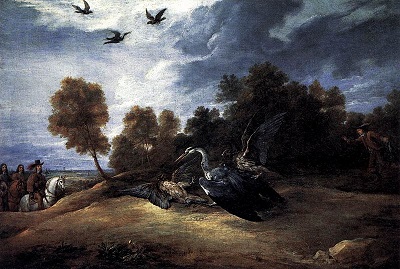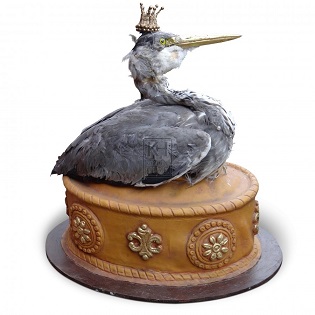As many of you might know I like to delve into the details behind those incidents in history that might otherwise be seen as simply too trivial, just casually mentioned in passing, deliberately downplayed, conveniently forgotten or otherwise overlooked: in short I like to find out what really happened. Such as with Henry VIII's hunting accident. Accordingly I've had a little ferret around in what's available online to get some background on Henry VIII's ignominious tumble in 1525.
The main source for the story is that given by Edward Hall in his chronicle, 'The Union of the Two Noble and Illustre Families of Lancastre and Yorke' (publ. 1548) in which he stated that in the regnal year Henrici XVI (that's 22 April 1525 to 21 April 1526):
In this yere the kyng folowing of his hauke lept ouer a diche beside Hychyn [ie Hitchen, Herts], with a polle and the polle brake, so that if one Edmond Mody, a foteman, had not lept into the water and lift up his hed, whiche was fast in the clay, he had been drouned: but God of his goodnes preserued him.The story is repeated almost word for word in Richard Grafton's 'Abridgement of the Chronicles of England' (publ. 1562) except that he gives the footman's name a Moody rather than Mody (a minor change given the lack of regularised spelling at the time). It was Grafton who'd published the 1548 first edition of Hall's chronicle following the author's death the year before, so it's not really surprising his telling of the story is essentially the same. The other key chronicler of Henry VIII's reign, Raphael Holinshed (c. 1525 – 1582), doesn't make any mention of the incident at all.
There are numerous and varied primary sources covering the year in question that are available online including letters, ambassador's reports, financial reports, tax records, court cases and other state papers - and not only originating from the English court but also from various foreign governments as well. If you supposed that the health of the English king might be of little interest to foreign potentates you could not be more wrong. Diplomatic despatches of the time are full of reports on the Habsburg Emperor Charles V's gout; that the English king had suddenly fled London after two of his retinue died of plague; speculation as so whether it was the hot summer that meant the English queen (Catherine of Aragon) was temporarily indisposed or, whisper it, might she actually be pregnant; that Francesco Sforza, the Duke of Milan, recently fell from his horse but was completely unhurt; and whether the illness that had been afflicting Francis I of France, now a guest/prisoner of the Spanish following his defeat in the Italian wars, was really malaria that he'd picked up from the marshes around the River Po, or was it, quelle horreur, the French pox! Sadly though, amongst all this fascinating Daily-Mail-like gossip, I could find no reference to the Hitichin incident in any of these records.
The fact that Henry's near death experience is not referred to in any English state papers may suggest that there was an effort to keep the incident covered up for political reasons, or it may just reflect that Henry, who was only 34 years of age and still regularly risked his life jousting, had simply shugged off the event. He might have nearly died but at the end of the day he had got away with no lasting damage done except to his dignity. The true seriousness of the incident was perhaps only really understood by the few retainers who'd been there, and of course by the king himself as it reinforced again his need for a legitimate son.
I did however find a short retelling of the story of Henry's fall and rescue in an odd little book published by John Gibbons in 1682 (ie. over 150 years after the event). This short pamphlet with the snappy title,
'Prince-protecting providences: or, A collection of some historical passages relating how several princes and personages ... have had miraculous preservations ...', was published after the restoration of Charles II as a clearly pro-monarchist tract cataloguing incidents when the author thought that God had divinely intervened to rescue annointed princes in their times of danger. The tale of Henry's tumble and provident rescue for the first part again largely follows Hall's form of words and is recounted thus:
Henry the Eighth, following his Hawk, leapt over a Ditch with a Pole, which broke; so that, if Edmund Moody (a Foot-man) had not leapt into the Water, and lift up the King's Head, which stuck in the Clay, he had been drown'd. (This Foot-man was rewarded both with Means and Arms, speaking his Service done to his Prince.) And the King lived to perform afterwards a Deed of grand Concern.However this retelling is particularly interesting as it also suggests that the footman was rewarded with "Means and Arms", ie he got a financial reward and was granted heraldic arms. When I looked further into grants of arms I duly found this:
 The ARMS and CREST of Edmund Moodye
The ARMS and CREST of Edmund Moodye
otherwise Moody of Bury St. Edmunds in the County of
Suffolk, A Gentleman, granted by letters patent under the
hand and seal of Thomas Hawley, Clarenceux King of Arms
on the sixth day of October 1541 in the thirty second year
of His Majesty KING HENRY VIII
for miraculously saving his life at Hitchin, County of Herts,
when leaping over a ditch with a pole which brake;
that if the said Edmund, a footman in the King's retinue,
had not leapt into ye water and lifted up the King's head,
he had drowned; for which he was rewarded.
"The Reward of Valor"
College of Arms London,
[signature indecipherable], Windsor Herald of Arms.
The top of the shield appears to show a pair of hands holding a Tudor rose, which if I have correctly interpreted the heraldic symbolism would represent a remarkably frank acknowledgement of Moody's role in supporting and indeed literally holding up the head of the Tudor monarchy. I also note how this grant of arms was made in October 1541, when Henry - now an increasingly infirm, bitter, suscpicious and vengeful man - had just completed his ponderous Progress of the North of England, the purpose of which had been to accept the formal surrender from those who had rebelled during the Pilgrimage of Grace and so stamp his firm authority over his potentially rebellious northern subjects. It was also during this Progress that rumours of Catherine Howard's indescretions with Thomas Culpepper and Francis Dereham first started to come to light, which resulted in her execution just three months later. What, I wonder, prompted Henry to reward Moody with a grant of arms at this time, fully sixteen years after the man's original 'act of valour'?
I also found a reference to Moody being granted
"a groat a day for life" in a book on the history of Hitchen (Reginald Hine, 'The History of Hitchin', publ by Unwin, 1927) but unfortunately this doesn't give an original source for the statement. A groat (four pence) a day amounts to six pounds a year, which wasn't a huge sum even in the sixteenth century when in a year a nobleman might expect to earn around £2,000, a merchant about £100, a skilled artisan could expect about £50, a clergyman £20, while a labourer or farm worker would earn around £8. Mark Smeaton, the talented but low-born musician who was implicated in Ann Bolelyn's treason, had officially earned £100 a year while employed in the royal household yet had been known to spend lavishly on fine clothes and horses; the implication being that a £100 salary, although something like ten times what a royal footman could expect to get, was so modest that he must have received money and gifts from the Queen in exchange for 'services' as her lover. Moody's pension was presumably in addition to his usual remuneration which would already have included board and lodging in the royal household and he may also have received grants of land, sinecures and other rewards. In this regard it should be noted that at around this time an Edmund Moody was made Bailiff of Dover Castle and he later served as MP for Dover - but they were not the same person, nor even from what I can find, were they closely related.
The same 'History of Hitchen' that says Moody was awarded a pension of a groat a day also links the incident to the origin of a pub name, the Buck's Head at Wymondley, which until fairly recently apparently depicted Henry's demise on its signboard, although how much of this is just made-up embellishment to fit the old tale is uncertain and remember Henry's accident was while he was hawking so he was not hunting a buck (deer).
Nevertheless it would seem that the essence of the original tale is by no means apocryphal. Moreover, with a bit of supposition I think it's possible to infer even more details about the incident.
Hall's account says the king was hawking in the vicinity of Hitchen and came a cropper when trying to cross a ditch or stream. To the west of Hitchen is a spur of dry chalk hills, but to the east of the town the area was (still is) low-lying, with flood meadows, reed beds and numerous springs from which arise several small streams that meander across the area: princially the river Hiz (despite the name it's actually a fairly small stream) and its similarly small tributaries the Purwell and Ippolyts (or St Ippollitts Brook). These streams all arise from springs in the underlying chalk bedrock which makes them very pure, so that even today (and now protected as nature reserves) they provide a rich habitat for fish, including rare brook trout, numerous waterbirds and other wildlife.

The River Purwell crossing Purwell meadows in the vicinity of Wymondley near Hitchin: and you can see why it might well have been described at the time as just a muddy ditch.
In the fourteenth-century manor records show there was a flourishing heronry at Purwell Ninesprings in the parish of Wymondley: in 1373 41 "branchers" - meaning young herons taken from the nests built in the branches of the trees - were sent from Purwell to London, to supply the royal court. Young herons were often taken from their nests but the mature birds were also a favourite 'sport' for falconers. An adult grey heron is a big heavy bird with a visciously sharp bill that regularly preys on large fish (trout, eels, tench, perch), grass-snakes, ducklings and other young birds, and even rats. To hunt them with a hawk or falcon requires a large bird of prey and even then the end result is not at all certain. Indeed the hunting of a heron with a hawk was a common allegory for a contest in which the outcome was uncertain and could go either way, such as in this painting by David Teniers the Younger, of Archduke Leopold Wilhelm of Austria hunting a heron with a two hawks and with the city of Brussels in the background - the heron here representing the Spanish Netherlands under attack from both France and the Dutch Republic - the two falcons shown.

'Archduke Leopold Wilhelm Hunting Heron', by David Teniers the Younger (circa 1655).
Henry was in the area specifically to hunt with his falcons and it is likely he was specifically intending to hunt herons, the biggest and most desirable game bird the area had to offer and for which it was famous. A falconer usually selected what type of hawk or falcon to take on a hunt based on what quarry he was aiming for. A peregrine might be used for medium-sized game birds up to the size of a duck amongst open scrub; a goshawk against ground-based quarry such as a hare in open grassland; a sparrowhawk for blackbird-sized prey in woodland; while a merlin was most suitable for small high-flying birds such as skylarks (and being small and generally more sociable than most hawks, merlins were also thought to be particularly suitable for ladies). Henry's favoured hunting bird was the peregrine falcon but to hunt a large, heavy bird like a heron really requires something bigger, in particular the gyrfalcon which is the largest species of falcon and thus emblematic of royalty but which could only be obtained at great expense from Scandinavia, Greenland or Iceland. There were, at least in theory, sumptuary laws defining what sort of hawk or falcon was permitted for one's rank and social standing, however simply because of the great expense in obtaining a goshawk, perigrine of gyrfalcon (and then to care for the bird you also had to employ several specialist keepers as well) all meant that in practice the posession of such top notch hawks and falcons was restricted to the upper levels of the nobility. Henry is known to have possessed and hunted with gyrfalcons which he kept with his other prize hawks and falcons at the Royal Mews located next to what is now Charing Cross railway station.
Interestingly the same state records which failed to record the Hitchin incident do describe hunting birds and hunting dogs being exchanged as prestgious gifts between princes. For example from the 'Calendar of State Papers Relating To English Affairs in the Archives of Venice', 1520-1526, there are these two entries:
1526 Feb 8. Mantuan Archives.
King Henry VIII. to Frederick [Gonzaga], Marquis of Mantua [in Latin].
Returns thanks for his loving letter, and for the present of two peregrine falcons, one of which died on the way, but the King is no less gratified than if it had arrived alive. Has detained the falconers who brought them, by reason of their skill in falconry, that the birds may be more carefully tended. Requests the Marquis to consent to his admitting these persons into his household.
Greenwich, 8th February 1526. (Signed) Henricus Rex.
1526 April 24. Mantuan Archives.
King Henry VIII. to Frederick [Gonzaga], Marquis of Mantua [in Latin].
[the King] Is aware of the Marquis's wish to render him service from his letters, and from many other indications of good will. To mark his [the King's] sense of this affection, [he] salutes him [the Marquis] through the present letter, and by means of his well-beloved attendant Tarabin ... [who] is charged to acquaint the Marquis with the King's goodwill by word of mouth, and to present him with two hobbies [small, very swift falcons] and some mastiffs and hounds ("molossos venati-cosque canes"). The King considers these gifts very small, but trusts the Marquis will accept them as a testimony of sincere affection. Should there be anything which the Marquis would wish to receive from England, he is to let the King know, through Tarabin, and he [the King] will have the pleasure of contenting him immediately.
Waltham, 24th April 1526. (Signed) Henricus Rex.At this time Henry owned several properties in Hertfordshire (he obtained quite a few more after the Dissolution) and one of these original royal residences was Maydencroft Manor in the hamlet of Gosmore within the wider parish of Wymondley. The house (it still exists) is only a couple of miles from the Purwell Ninesprings area which is roughly where the pole vaulting incident seems to have occurred. Accordingly it is highly likely Henry was staying at Maydencroft Manor when he was hawking in 1525. On the day in question, having launched his hawk onto a suitable prey, it seems he set out on foot with just a few retainers in attendance to recover his valuable bird and claim whatever it had caught. He likely came to grief crossing either the Purwell stream itself or another similar small brook and was saved by the prompt action of a lowly footman, who was most likely present as a general dogsbody, only there to fetch and carry as required. Were Moody's quick reactions those of a loyal retainer -perhaps prompted by the slow reactions of other more lordy members of the hunting group who may have been loath to muddy their fine clothes - or was it a more calculated action with an eye to a chance? Who can say?
I'm sure Henry did eventually get his hawk back safely but I expect the heron, if it hadn't already been eaten by the errant hawk, was probably served up for dinner a day or so later, perhaps in a pie with a ginger, mustard and vinegar sauce as was the style of the time. By then everyone dining on the heron and whatever else had been caught, could laugh at the king's mishap, his athleticism, derring-do and bravado ... while privately reflecting how different all their lives might have been if the king had indeed died face down in the mud without having yet produced a legitimate male heir.

A tudor-style heron and salmonella pie ... yum, yum!
PS :
I hope Temperance sees this and comments - like me she used to delight in delving into the minutae Tudor life. Wherever are you Temp?
